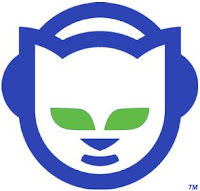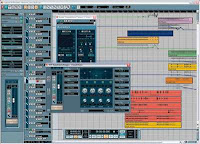With many different models of Ipod available it is easy to see that Apple is trying to make a product for each different segment. Each different Ipod comes in a range of colours and has different uses for different people. Firstly the Ipod shuffle which is the smallest and considered by most (myself included) to be the most the most practical and the most convinent weighing in at a whopping 15.6 g and is the smaller than many memory sticks available today. Though the smallest and the cheapest of the range the shuffle only has the feature to play music with no screen to show videos or even song titles Next in line is the Ipod classic which resembles very closely to the Ipods which were originally released back in 2001 with the feaures of video playback as well as games to play. The newer models are the touch and the nano with the touch also being a internet enabled music player so one could almost buy music directly on their Ipod.
Thursday, May 15, 2008
Itunes making music a lot easier for all (well some).
Many people myself included find that while looking for certain albums it is not only frustrating as not only many shops don’t have them but ordering them takes months and eventually when the cd does arrive it costs well over the norm. Itunes has allowed for people to gain access to a huge database of music and to download music for a lot cheaper and much easier to find and you also don’t have the hassle of having to order the album and having to wait months to arrive it mainly depends on the speed on your connections. The actual program itself is a nuisance to use that puts music onto your Ipod but the Itunes store is relatively user-friendly. The one problem is that Itunes caters for people who own an Ipod so this does pose the debate of whether or not Itunes is just adding to the digital divide that people seem to fear will arise.
The actual program of Itunes is also noted as being a useful music player that sorts out music as like a library would which however will not match either Winamp or Windows Media Player in terms of ease of use or popularity. The actual program is able to extract music from an audio cd as well as burn data and audio discs.
The actual program of Itunes is also noted as being a useful music player that sorts out music as like a library would which however will not match either Winamp or Windows Media Player in terms of ease of use or popularity. The actual program is able to extract music from an audio cd as well as burn data and audio discs.
Wednesday, May 14, 2008
New Media and Stealing Handbags
 We all at one point have seen the anti-piracy advertisements on dvds. In these adds, copying of dvds is likened to such things as stealing handbags and cars. While these advertisements are focused specifically on pirating movies, the same school of thought applies to music. With new media innovations such as the internet and cd writers, it has become easy to pirate music by copying cds as well as disseminating copyrighted material over the internet.
We all at one point have seen the anti-piracy advertisements on dvds. In these adds, copying of dvds is likened to such things as stealing handbags and cars. While these advertisements are focused specifically on pirating movies, the same school of thought applies to music. With new media innovations such as the internet and cd writers, it has become easy to pirate music by copying cds as well as disseminating copyrighted material over the internet.Napster (http://computer.howstuffworks.com/napster.htm) is the most widely known facet of this topic. Basically, the original Napster was created as a means for people to transfer their own band's intellectual property and disseminate their own music. However, people used this service in order to share copyrighted material and pirate music. Many recording artists such as Lars Ulrich (of Metallica claim) did not appreciate this and sought to sue the creator of Napster. Because of this huge media backlash, Napster was forced to shut down.
This was one victory in the quest to protect intellectual property but sadly, barely dented the world of piracy. Just do a google search of an album you want with the term "torrent" on the end of the album/artist name and you will see what I mean.
Quote of the day (from South Park Season 10 Episode 5): "Meet Lars Ulrich. Lars wants to have a gold-plated shark tank bar installed next to his pool, but because of scum like you pirating his music, he must now wait a few months!"
More People = More Rubbish
While music is by no means a new media phenomenon, we can very clearly note how the new media is transforming the music world as we know it. Never before have their been so many people listening to music before as their are now. The Ipod craze proves this.

With the ease of purchasing songs evident in the world today (through Itunes etc.) and so many people purchasing music, we note a very intense and still growing market. Because of this we note so many artists emerging at a rapid rate. I realize this every time I turn on the radio or watch television and hear songs and artists I have never heard of before. This follows an age old business strategy; if there are people out there who want your product, create many similar products and sell, sell, sell!
I really do not feel that this is good for the music industry. Where, in the past, only talented an innovative bands became famous (The Rolling Stones, Jimi Hendrix, Led Zeppelin), more recently, anyone who follows a popular sound and approach tends to prevail. Judging by all the clones of the current popular culture icons appearing, it seems to me that the music industry has its focus on the wrong places. Instead of innovation we note cloning.
I feel that any music produced should be an extension of (a)n individual or group of individuals (bands) soul(s). Music should be about feeling and a representation of a persons opinions and ideals. Music should not be about copying a tried and tested laid out formula.

With the ease of purchasing songs evident in the world today (through Itunes etc.) and so many people purchasing music, we note a very intense and still growing market. Because of this we note so many artists emerging at a rapid rate. I realize this every time I turn on the radio or watch television and hear songs and artists I have never heard of before. This follows an age old business strategy; if there are people out there who want your product, create many similar products and sell, sell, sell!
I really do not feel that this is good for the music industry. Where, in the past, only talented an innovative bands became famous (The Rolling Stones, Jimi Hendrix, Led Zeppelin), more recently, anyone who follows a popular sound and approach tends to prevail. Judging by all the clones of the current popular culture icons appearing, it seems to me that the music industry has its focus on the wrong places. Instead of innovation we note cloning.
I feel that any music produced should be an extension of (a)n individual or group of individuals (bands) soul(s). Music should be about feeling and a representation of a persons opinions and ideals. Music should not be about copying a tried and tested laid out formula.
Recording Becomes Professional
Everybody who has ever started learning a musical instrument has dreamed of being in a world renowned touring band. A huge part of this is the recording process. Where in the past, recording near professional quality songs from the comfort of ones own home was near impossible (in the old days of analogue 8-16 track recording devices), recently this has been changing.
Obviously in order to obtain a high quality professional recording, a band would need to utilize a multi-million dollar studio but home recordings are getting closer and closer to this quality (as close as possible when considering the amount of equipment utilized of course).

Upon visiting the "Marshall Music" (a popular South African music store franchise) website (www.marshallmusic.co.za) one can visit the recording equipment section. New Media software such as "Propellerhead Reason" allows one to create drum loops, synthesizers and samples of different sounds (keyboards etc.) in the context of the average person's home. In addition to this, "Steinberg Cubase SX allows one to record audio (guitar and drum playing for example) using hardware such as the "Maya 1010" and put songs together with great ease.
I find it amazing that as little as even 10 years ago the idea of putting together a high quality (compared to the current equipment mentioned) and very cost effective home recording studio seemed like a daunting task but now could be done with as little as R10 000 in start up capital (with this including every piece of equipment necessary). This is very clearly another example of the new media explosion where everything is available to the common man at a fraction of the cost as in the days of old where new software and hardware, that has never before been available, is hitting the market.
Obviously in order to obtain a high quality professional recording, a band would need to utilize a multi-million dollar studio but home recordings are getting closer and closer to this quality (as close as possible when considering the amount of equipment utilized of course).

Upon visiting the "Marshall Music" (a popular South African music store franchise) website (www.marshallmusic.co.za) one can visit the recording equipment section. New Media software such as "Propellerhead Reason" allows one to create drum loops, synthesizers and samples of different sounds (keyboards etc.) in the context of the average person's home. In addition to this, "Steinberg Cubase SX allows one to record audio (guitar and drum playing for example) using hardware such as the "Maya 1010" and put songs together with great ease.
I find it amazing that as little as even 10 years ago the idea of putting together a high quality (compared to the current equipment mentioned) and very cost effective home recording studio seemed like a daunting task but now could be done with as little as R10 000 in start up capital (with this including every piece of equipment necessary). This is very clearly another example of the new media explosion where everything is available to the common man at a fraction of the cost as in the days of old where new software and hardware, that has never before been available, is hitting the market.
New Market Sector for Music
Everywhere we look we can note examples of how new media innovations are "pimping up" almost every facet of our lives. Music, for me, has been an important part of my identity and through it, I seek to put meaning in my life. It is therefore extremely clear that new media innovations in music would be an interesting topic for me to consider.
One such innovation which music is faced with would be the online purchase of music. I realise that there is some overlap with the Ipod section included in this blog but I thought I'd speak from my own perspective.
Nobody can dispute the fact that traveling to a music store to buy an album (and risking the album one is searching for is not in stock) can seem like a chore to some. Who would not consider downloading an artist's new album from the comfort of one's own home to be extremely convenient? Furthermore, the extremely competitive prices ($9.99 standard (http://www.coolfer.com/blog/archives/2006/05/itunes_album_pr.php)) aids in enticing more people to purchase albums via this approach.
Of course, many people (including myself) still prefer to purchase albums in a more physical form (with a cd case and album jackets included) with the general sentiment that they are receiving more for their money than just a series of songs in digital format on a hard drive. Judging by the success of Itunes (a major market leader in online album sales) however, it seems as though many people do not mind paying $9.99 for an album in digital format when $14 seems to be a general price for ordering albums from Amazon.com. It leads me to wonder if the Itunes craze is in fact the future, a future in which I (and people with a similar opinion to me) are merely slow in keeping up with. Time will tell.
One such innovation which music is faced with would be the online purchase of music. I realise that there is some overlap with the Ipod section included in this blog but I thought I'd speak from my own perspective.
Nobody can dispute the fact that traveling to a music store to buy an album (and risking the album one is searching for is not in stock) can seem like a chore to some. Who would not consider downloading an artist's new album from the comfort of one's own home to be extremely convenient? Furthermore, the extremely competitive prices ($9.99 standard (http://www.coolfer.com/blog/archives/2006/05/itunes_album_pr.php)) aids in enticing more people to purchase albums via this approach.
Of course, many people (including myself) still prefer to purchase albums in a more physical form (with a cd case and album jackets included) with the general sentiment that they are receiving more for their money than just a series of songs in digital format on a hard drive. Judging by the success of Itunes (a major market leader in online album sales) however, it seems as though many people do not mind paying $9.99 for an album in digital format when $14 seems to be a general price for ordering albums from Amazon.com. It leads me to wonder if the Itunes craze is in fact the future, a future in which I (and people with a similar opinion to me) are merely slow in keeping up with. Time will tell.
Would you like an Ipod with your accessories?
With all the accessories available for Ipods these days it kind of makes you wonder which is becoming more important. New developments such as the docking station with speakers almost can nowadays can replace the hassle of going out and buying a mini hi-fi. Also a transmitter that can allow for people to listen to music on their Ipods via their radio be it in the car or at home and now there is a component that allows people the listen to the radio on their Ipods so not only only podcasts becoming very popular with services such as 'Talking metal' which is a podcast service that allows users to download an interview which their favourite bands but now the radio is also being brought back into the equation which is something that many thought Ipods would put out of business.
Another very interesting development is the new Nike+Ipod Sport Kit which can give you feedback on your workouts and allows you to track your performance on you computer. Another is a component that allows you to watch videos form your ipod on yout tv. So with the new developments it does pose the question do people still buy Ipods with the mentality of having personla music or whether they buy the product with all the different components and benefits from buying it.
All products mentioned are availible for purchase at http://store.apple.com/us
Another very interesting development is the new Nike+Ipod Sport Kit which can give you feedback on your workouts and allows you to track your performance on you computer. Another is a component that allows you to watch videos form your ipod on yout tv. So with the new developments it does pose the question do people still buy Ipods with the mentality of having personla music or whether they buy the product with all the different components and benefits from buying it.
All products mentioned are availible for purchase at http://store.apple.com/us
Subscribe to:
Comments (Atom)

